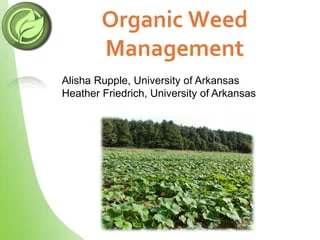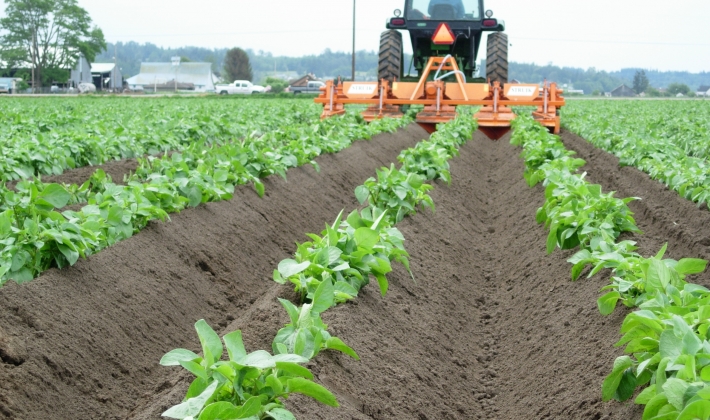
Organic farming weed management is a crucial aspect of maintaining a healthy and productive organic farm. Unlike conventional farming, which often relies on synthetic herbicides, organic farming weed management emphasizes natural and sustainable methods to control unwanted plants. This approach not only helps in preserving soil health and biodiversity but also aligns with the core principles of organic agriculture, which focus on minimizing environmental impact and promoting ecological balance.

One of the foundational techniques in organic farming weed management is the use of mulching. Mulching involves covering the soil surface with organic materials such as straw, grass clippings, or wood chips. This layer serves several purposes: it suppresses weed growth by blocking sunlight, retains soil moisture, and improves soil structure as it decomposes. Organic farmers often use mulch in combination with other methods to create a comprehensive weed management strategy. For instance, straw mulch can be particularly effective in preventing weed seed germination and reducing the need for manual weeding.
Another key component of organic farming weed management is crop rotation. By alternating the types of crops grown in a particular area, farmers can disrupt the life cycles of weed species and reduce their prevalence. Different crops compete with weeds in various ways, and rotating them helps in managing weed populations more effectively. For example, planting a cover crop like clover during the off-season can prevent weeds from taking over, as clover provides ground cover and competes with weeds for resources. This rotation not only helps in weed control but also contributes to soil fertility and reduces the risk of soil erosion.
Hand weeding is another essential practice in organic farming weed management. While labor-intensive, hand weeding allows farmers to target weeds directly without disturbing the surrounding soil or harming desirable plants. This method is particularly useful in small-scale operations or in areas where weeds have become resistant to other control measures. Hand weeding can be combined with other techniques, such as mulching or using a hoe, to enhance its effectiveness. Despite its challenges, hand weeding remains a valuable tool for maintaining weed control and ensuring the health of organic crops.
Cover crops are also an important strategy in organic farming weed management. These plants are grown primarily to cover the soil and prevent weeds from establishing. Cover crops like buckwheat, rye, or vetch can outcompete weeds for light, water, and nutrients, effectively reducing their growth. Additionally, cover crops can improve soil fertility and structure, making them a dual-purpose tool in organic farming. When selected and managed properly, cover crops can significantly reduce the weed seed bank and enhance overall farm productivity.
Another innovative approach in organic farming weed management is the use of organic herbicides. These natural herbicides are derived from plant or animal sources and are designed to target specific weed species without harming crops. Common examples include vinegar-based herbicides or those made from essential oils. While organic herbicides may not be as potent as synthetic ones, they can be effective when used in conjunction with other weed management practices. They offer an alternative for managing weeds without compromising the organic integrity of the farm.
Maintaining soil health is also integral to effective organic farming weed management. Healthy soil supports robust plant growth, which in turn can outcompete weeds more effectively. Practices such as composting, adding organic matter, and minimizing soil disturbance contribute to soil health and enhance the competitiveness of crops. Healthy soil promotes strong root development and increases the resilience of plants against weed competition. By focusing on soil health, organic farmers create a more balanced and productive growing environment.
Incorporating mechanical methods, such as the use of weed barriers or cultivation tools, can also support organic farming weed management. Weed barriers, like landscape fabric or biodegradable films, can physically block weeds from accessing sunlight and growing. Cultivation tools, such as rotary hoes or flame weeding equipment, can help in managing weeds between rows of crops. These methods can be particularly useful in conjunction with other strategies, providing a multifaceted approach to weed control.
Overall, organic farming weed management requires a combination of techniques tailored to specific farm conditions and weed challenges. By integrating practices such as mulching, crop rotation, hand weeding, cover cropping, and the use of organic herbicides, farmers can effectively manage weeds while maintaining the principles of organic agriculture. Each method contributes to a holistic approach that supports soil health, biodiversity, and sustainable farming practices. As organic farming continues to evolve, ongoing research and innovation in weed management will play a crucial role in enhancing the effectiveness and efficiency of these strategies. By embracing a diverse array of weed management practices, organic farmers can achieve successful and sustainable weed control while upholding the values of organic agriculture.









